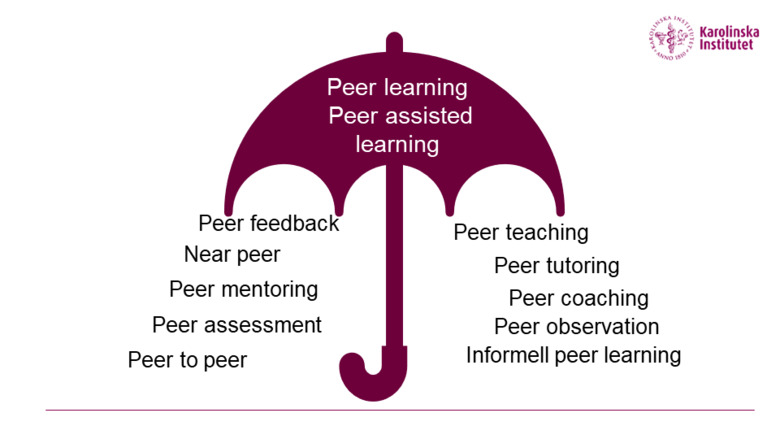Background - Peer learning
Peer learning is an educational model that emphasises a student-activating approach to learning where students achieve skills and knowledge together. The term ‘peer’ signifies a partnership of equals—whether they be fellow students or coursemates—each bringing their unique perspectives to enrich the learning. This approach, sometimes referred to as ‘learning in pairs,’ transforms the educational experience into a shared learning experience.
Peer learning - a way of learning
The idea of peer learning is that students in a flexibe but structured way are stimulated to collaborate and use each other as resources to integrate theory and practice during workplace-based learning or in other learning situations. Peer learning has a lot in common with other collaborative educational models that encourage self-directed and more independent learning, such as team-based learning (TBL) or problem-based learning (PBL).
Peer learning is based on social constructivist learning theory, which means that peers within the same profession learn from and with each other. This can also occur in interaction with other professions. Peer learning focuses on the students’ own self-directed learning and not on the teacher’s instruction.
In peer learning, two or more students from the same education and facing the same situation are assigned structured tasks which they then solve with more or less support from their supervisor during the placement. None of the students have the formal role of teacher/supervisor, nor do they have formal power over each other. The role of the one who teaches/educates alternates between the students and the learning activities.

With peer learning the students train their ability to:
- Collaborate and communicate
- Take responsibility for their own and their study companion’s learning
- Problem-solve and reflect together on different learning situations
- Formulate their own positions, oppinions, ideas, hypothisis'
- Seek and critically appraise answers to their questions
- Conduct clinical reasoning with a critical approach
- Give and receive feedback
- Assess their own and their study companion’s development in relation to learning objectives
- Maintain a professional approach and reasoning
The above mentioned generic competencies are examples of important factors in the future professional lives of the students, these competencies are also seen as an important part of the lifelong learning process.
Why use peer-learning during workplace-based learning?
- Less prestige among students, they help each other to solve tasks.
- Students can both challenge and support each other.
- Increases the student’s sense of safety and can facilitate socialisation into the workplace.
- Students can always turn to each other to discuss and reflect, which can save time for the supervisor as they may not need to supervise these processes to the same extent as in other supervision models.
- Increases students’ independence and responsibility.
- Promotes deep learning.
- When the students collaborate, the supervisor has the opportunity to also assess generic competencies on an individual level.
Concepts and definitions
Peer assisted learning (PAL) and peer learning are both overarching concepts that involve students learning from and with each other. The emphasis is on the mutual learning process.
We have chosen to use peer learning in this guide at KI as the term is commonly used in clinical practice. Peer learning can be applied in various ways, and therefore the terminology varies in the literature. The further reading at the end is recommended for those who want to read more about the concepts.

Collaboration partners
The peer learning guide has been developed by the Unit for Teaching and Learning (UoL) at Karolinska Institutet in collaboration with Region Stockholm and the individual colleges. The material is based on existing material that originally was developed by the Center for Clinical Education (CKU) in cooperation with supervisors, clinical lecturers (Akor), and teachers from educational institutions within Region Stockholm. CKU-KI has since 2019 been a part of UoL KI.

